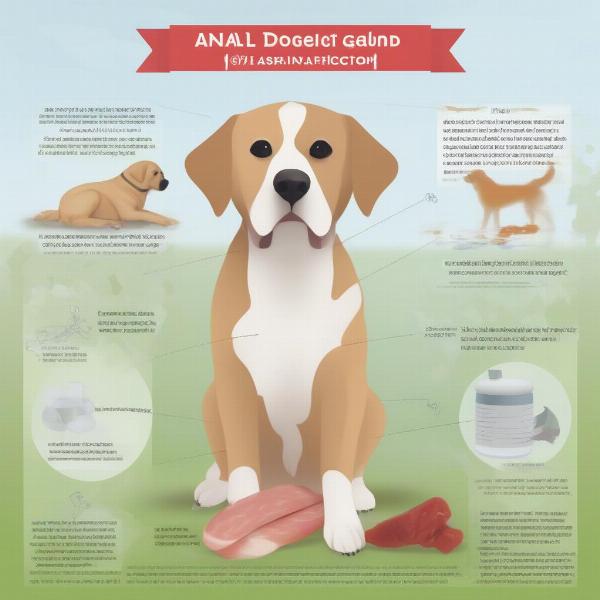Anal gland issues are a common and often unpleasant problem for dogs. If your furry friend is scooting, licking excessively, or exhibiting discomfort around their rear, they might be experiencing anal gland problems. This guide explores anal gland medicine for dogs, covering symptoms, causes, treatment options, and preventative measures. Understanding these issues is key to keeping your canine companion happy and healthy.
Understanding Anal Gland Issues in Dogs
Anal glands, also known as anal sacs, are small pouches located on either side of your dog’s anus. They secrete a foul-smelling fluid that normally empties during defecation. However, sometimes these glands can become impacted, infected, or even abscessed. This can lead to discomfort and require veterinary attention.
Symptoms of Anal Gland Problems
Several signs indicate your dog might be experiencing anal gland issues:
- Scooting: This is the most common symptom. Your dog drags their rear end across the floor to try and relieve pressure and discomfort.
- Excessive licking: Constant licking or biting at the anal area can be a sign of irritation or infection.
- Foul odor: A strong, fishy smell emanating from your dog’s rear is a telltale sign of anal gland problems.
- Discomfort: Your dog may whine, yelp, or exhibit signs of pain when sitting or defecating.
- Swelling: You may notice redness and swelling around the anus.
Causes of Anal Gland Problems
 Causes of Anal Gland Problems in Dogs
Causes of Anal Gland Problems in Dogs
Several factors can contribute to anal gland problems in dogs:
- Diet: Soft stools can prevent the glands from emptying naturally.
- Obesity: Excess weight can put pressure on the anal glands.
- Allergies: Allergies can cause inflammation and swelling, affecting gland function.
- Infections: Bacteria can enter the glands and cause infection.
Treatment Options: Anal Gland Medicine for Dogs
If you suspect your dog has anal gland issues, consult your veterinarian. They can diagnose the problem and recommend the best course of treatment. Treatment options may include:
- Manual expression: Your veterinarian can manually empty the glands.
- Antibiotics: If an infection is present, antibiotics will be prescribed. dog anus gland removal
- Anti-inflammatory medication: This can help reduce swelling and pain.
- Warm compresses: Applying warm compresses to the area can provide relief.
- Dietary changes: Switching to a high-fiber diet can help firm up stools and promote natural emptying.
- Surgical removal: In severe cases, surgical removal of the anal glands may be necessary.
When to See a Vet
If your dog is exhibiting any of the symptoms mentioned above, it’s essential to schedule a veterinary appointment. Prompt treatment can prevent the problem from worsening and causing further discomfort. lutalyse for dogs
Preventing Anal Gland Problems
While not all anal gland problems are preventable, some measures can help reduce the risk:
- High-fiber diet: Feeding a diet rich in fiber can promote regular bowel movements and help empty the glands naturally.
- Weight management: Maintaining a healthy weight for your dog can reduce pressure on the anal glands.
- Regular exercise: Exercise can also help regulate bowel movements and prevent constipation. natural remedies for cushing’s disease in dogs
Conclusion
Anal gland problems can be uncomfortable for your dog, but with proper care and attention, they can be managed effectively. Understanding the causes, symptoms, and treatment options can help you keep your furry friend happy and healthy. Don’t hesitate to contact your veterinarian if you suspect your dog is experiencing anal gland issues. jesus in dogs bum
FAQ
- How often should a dog’s anal glands be expressed? Ideally, a dog’s anal glands should empty naturally during defecation. If they don’t, and your dog is experiencing problems, consult your vet.
- Can I express my dog’s anal glands at home? While possible, it’s generally recommended to have a veterinarian perform this procedure to avoid injury or infection.
- Are certain breeds more prone to anal gland problems? Smaller breeds tend to be more susceptible to anal gland issues.
- Is there anal gland medicine for dogs I can administer at home? Only your veterinarian can prescribe appropriate medication.
- What are the long-term implications of untreated anal gland problems? Untreated issues can lead to infections, abscesses, and even rupture of the anal glands.
- How can diet help prevent anal gland problems? A high-fiber diet can help firm up stools and promote natural emptying of the glands.
- Can allergies cause anal gland problems? Yes, allergies can contribute to inflammation and swelling, affecting gland function.
ILM Dog is a leading international online resource dedicated to providing dog owners with expert advice and information on all aspects of canine care. From breed selection and health to training and nutrition, ILM Dog offers comprehensive guides and resources to help you provide the best possible care for your furry companion. We specialize in helping dog owners understand their pet’s needs, offering valuable insights into everything from puppy care to senior dog wellness. Contact us today for more information at [email protected] or +44 20-3965-8624. ILM Dog is here to help you navigate the wonderful world of dog ownership.